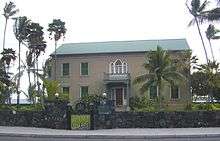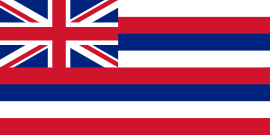Hulihe'e Palace
|
Huliheʻe Palace | |
|
| |
 | |
| Location | 75-5718 Aliʻi Drive, Kailua-Kona, Hawaii |
|---|---|
| Coordinates | 19°38′22″N 155°59′40″W / 19.63944°N 155.99444°WCoordinates: 19°38′22″N 155°59′40″W / 19.63944°N 155.99444°W |
| Area | 1 acre (0.40 ha) |
| Built | 1838 |
| Architect | John Adams Kuakini, |
| NRHP Reference # | 73000653[1] |
| Added to NRHP | May 25, 1973 |
The Huliheʻe Palace[2] is located in historic Kailua-Kona, Hawaiʻi, on Ali'i Drive. The former vacation home of Hawaiian royalty, it was converted to a museum run by the Daughters of Hawaiʻi, showcasing furniture and artifacts. It is located at 75–5718 Aliʻi Drive, Kailua-Kona.
History
The palace was originally built out of lava rock by John Adams Kuakini (governor of the island of Hawaiʻi) during the Kingdom of Hawaii. When he died in 1844 he left it to his hānai (adopted) son William Pitt Leleiohoku I, the son of Prime Minister William Pitt Kalanimoku.[3] Leleiohoku died in the measles epidemic of 1848 and left it to his son John William Pitt Kīnaʻu, but he died young and the palace went to his mother Princess Ruth Keʻelikōlani. Ruth made Huliheʻe her chief residence for most of her life, but she preferred to sleep in a grass hut on the palace grounds rather than in the palace. She invited all of the reigning monarchs to vacation at Huliheʻe, from Kamehameha III to Liliʻuokalani. Ruth died and left the palace to her cousin and sole heir Princess Bernice Pauahi Bishop.
It was later sold to King Kalākaua and Queen Kapiʻolani. Kalākaua renamed the palace Hikulani Hale, which means “House of the Seventh ruler,” referring to himself, the seventh monarch of the monarchy that began with King Kamehameha I. In 1885, King Kalākaua had the palace plastered over the outside to give the building a more refined appearance. After Kalākaua's death it passed to Kapiʻolani who left Huliheʻe Palace to her two nephews, Prince Jonah Kūhiō Kalanianaʻole Piʻikoi and Prince David Kawānanakoa.[4] In 1927 the Daughters of Hawaiʻi, a group dedicated to preserving the cultural legacy of the Hawaiian Islands, restored Huliheʻe Palace and turned it into a museum. It was added to the National Register of Historic Places listings on the island of Hawaii in 1973 as site 73000653.[3]
The palace's walls and ceiling had slight cracks following the 2006 Kiholo Bay earthquake that was centered on the Kohala coast.
Images
 Huliheʻe Palace, seen from Aliʻi Drive.
Huliheʻe Palace, seen from Aliʻi Drive. Huliheʻe Palace after 2006 earthquake. (01/2007)
Huliheʻe Palace after 2006 earthquake. (01/2007)- South wall after 2006 earthquake. (01/2007)
 Earthquake damage, as of January 2007.
Earthquake damage, as of January 2007. Princess Ruth's grass house that stood on the palace grounds.
Princess Ruth's grass house that stood on the palace grounds.
References
- ↑ National Park Service (2010-07-09). "National Register Information System". National Register of Historic Places. National Park Service.
- ↑ Mary Kawena Pukui, Samuel Hoyt Elbert and Esther T. Mookini (2004). "lookup of Huliheʻe". in Place Names of Hawai'i. Ulukau, the Hawaiian Electronic Library, University of Hawaii Press.
- 1 2 Dorothy Riconda and Robert M. Fox (September 28, 1972). "Huliheʻe Palace Nomination Form" (PDF). National Register of Historic Places web site. Retrieved 2009-09-14.
- ↑ Hawaiian Encyclopedia : Part 1: Complete Timeline of Hawaiian History
External links
![]() Media related to Hulihee Palace at Wikimedia Commons
Media related to Hulihee Palace at Wikimedia Commons
- The Huliheʻe Palace official web site
- Historic American Buildings Survey (HABS) No. HI-49, "Hulihee Palace, Alii Drive, Kailua, Hawaii County, HI", 2 photos, 8 measured drawings, 9 data pages, 1 photo caption page
